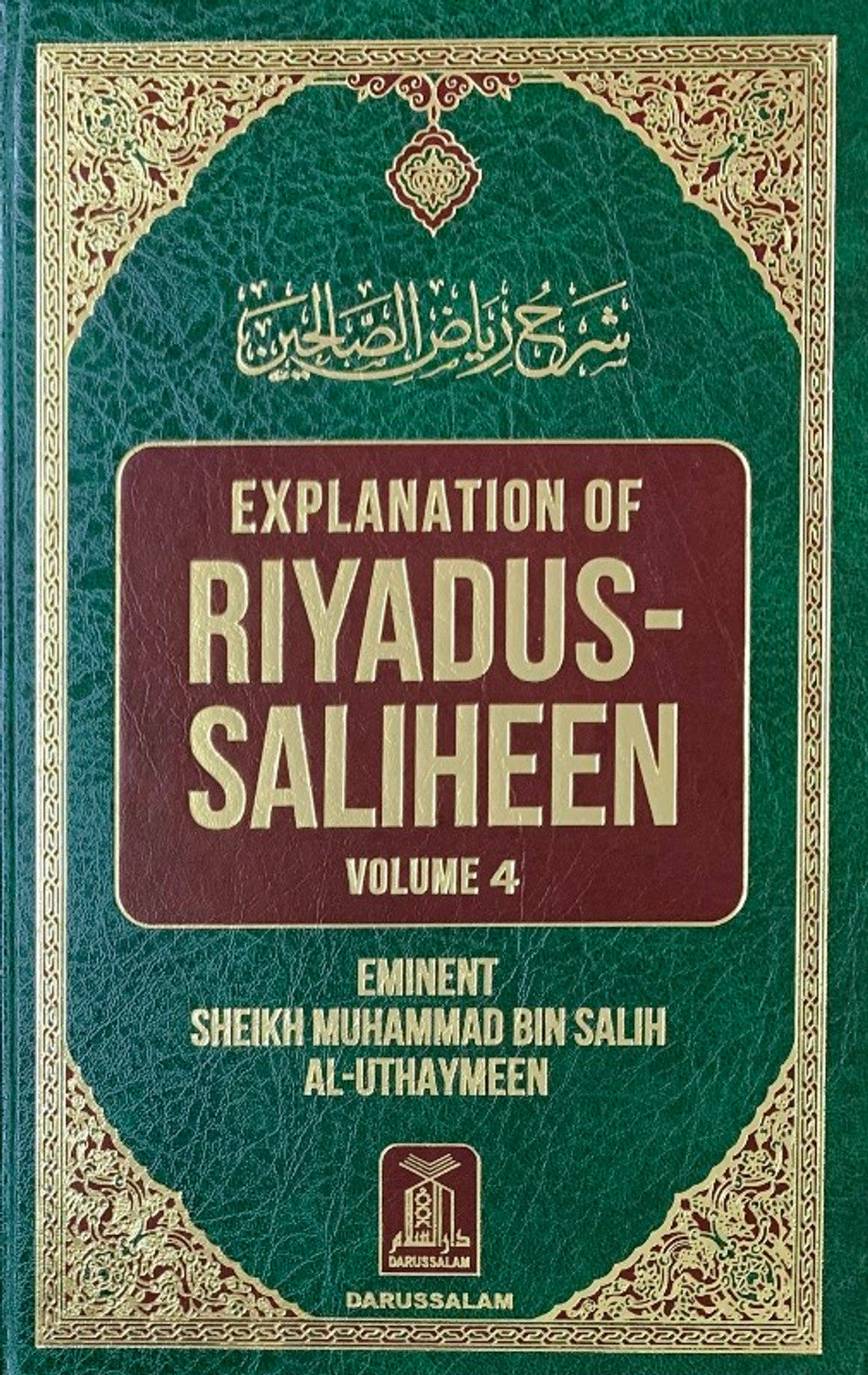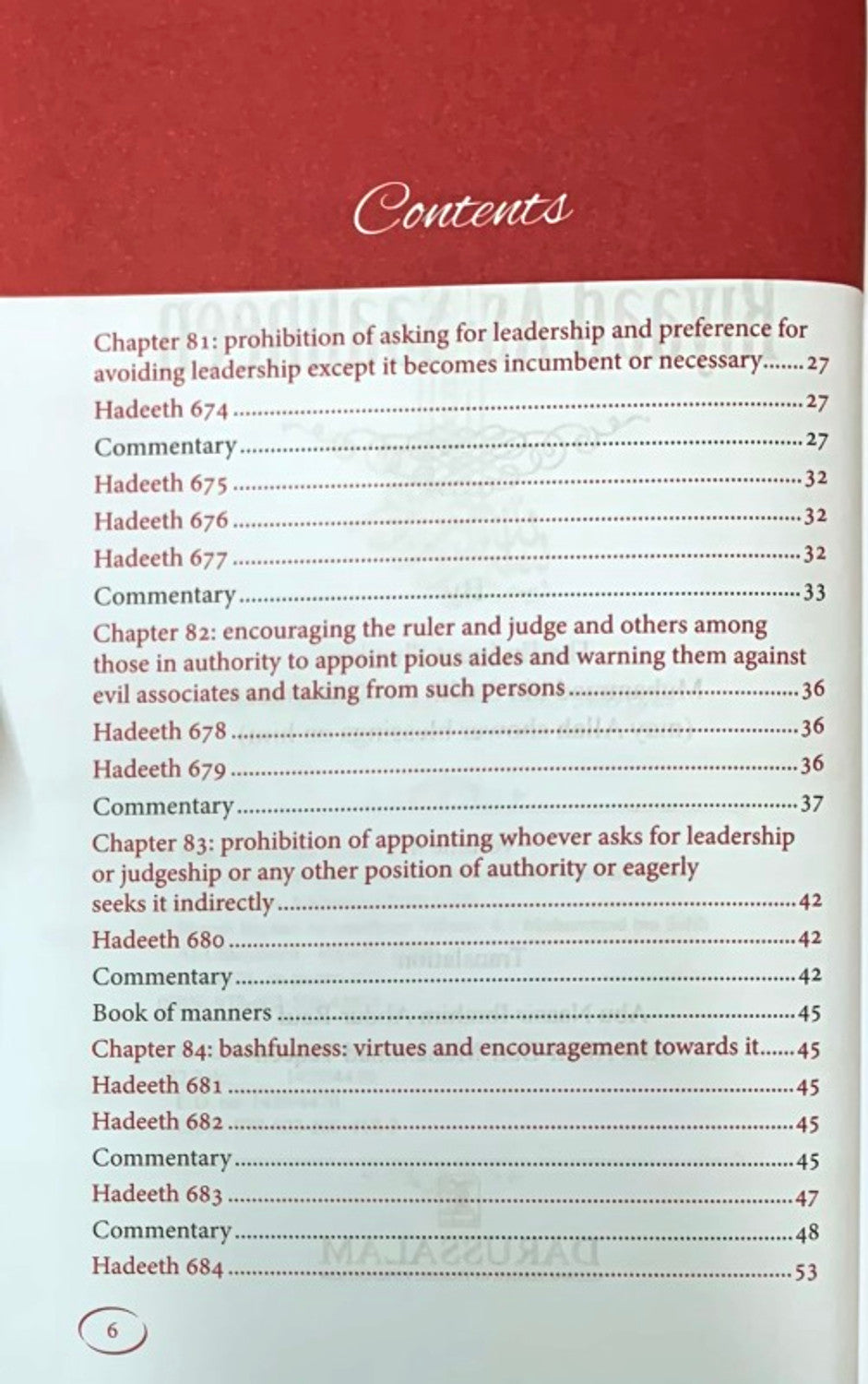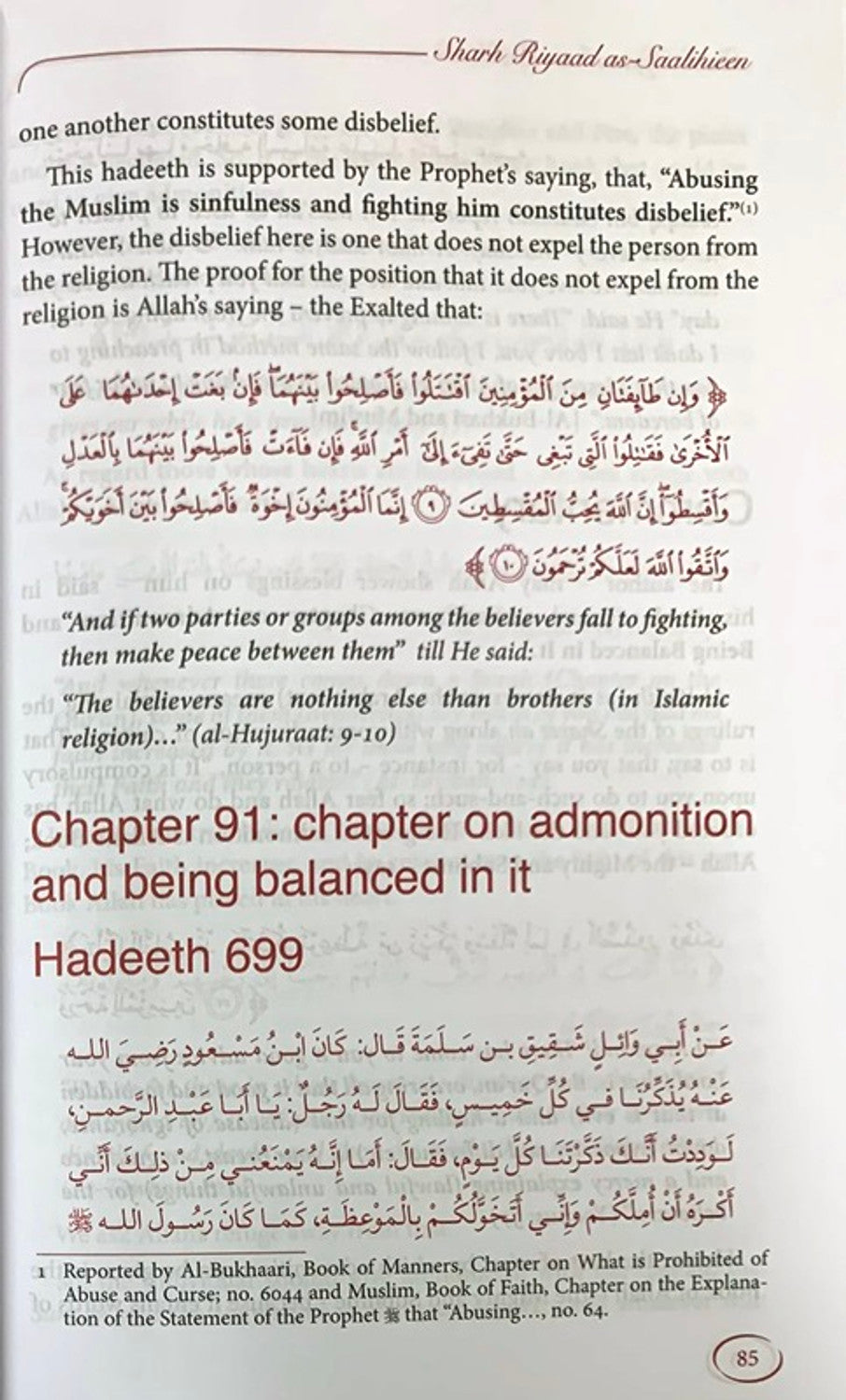Explanation of Riyad-us-Saliheen (Vol 4) Sharh Riyad-us-Saliheen) by Sheikh Muhammad Bin Salih Al-Uthaymeen
Explanation of Riyad-us-Saliheen (Vol 4) Sharh Riyad-us-Saliheen) by Sheikh Muhammad Bin Salih Al-Uthaymeen
Publisher:
Darussalam
Author:
Sheikh Muhammad Bin Salih Al-Uthaymeen
Language:
English
Binding:
Hard Cover
Pages: 677
Size: 15x22cm
Couldn't load pickup availability



Collapsible content
Description of Book
Explanation of Riyad-us-Saliheen (Vol 4) is a detailed commentary on Imam Nawawi’s renowned hadith collection, Riyad-us-Saliheen. This volume continues the in-depth analysis of selected authentic narrations, focusing on themes of morality, worship, social conduct, and spiritual development. Written in a clear and accessible style, the commentary simplifies complex hadith meanings and connects them to daily Muslim life, making it ideal for students, scholars, and general readers seeking deeper understanding and practical application of the Sunnah. Carefully referenced and explained by qualified scholars, this volume is part of a trusted series for building strong Islamic character.
Publisher
Darussalam
Author
- Sheikh Muhammad Bin Salih Al-Uthaymeen
Sample Pages - Content
Page:01
شرح رياض الصالحين
EXPLANATION OF
RIYADUS- SALIHEEN
VOLUME 4
EMINENT
SHEIKH MUHAMMAD BIN SALIH AL-UTHAYMEEN
DARUSSALAM
DARUSSALAM
Page:02
Contents
nd prefere
Chapter 81: prohibition of asking for leadership and preference for avoiding leadership except it becomes incumbent or necessary....... 27
Hadeeth 674......
Commentary..
Hadeeth 675
Commentary..
Chapter 82: encouraging the ruler and judge and others among those in authority to appoint pious aides and warning them against evil associates and taking from such persons.
Hadeeth 678.
Hadeeth 679.
Commentary...
Chapter 83: prohibition of appointing whoever asks for leadership or judgeship or any other position of authority or eagerly
seeks it indirectly..
Hadeeth 680.
Commentary.
Book of manners
Chapter 84: bashfulness: virtues and encouragement towards it....... 45
Hadeeth 681
Hadeeth 682.
Commentary.Hadeeth 683.
Commentary.
MAJACCURAC
Hadeeth 684.
Page:03
one another constitutes some disbelief.
Sharh Riyaad as-Saalihieen
This hadeeth is supported by the Prophet's saying, that, "Abusing the Muslim is sinfulness and fighting him constitutes disbelief."(1) However, the disbelief here is one that does not expel the person from the religion. The proof for the position that it does not expel from the religion is Allah's saying - the Exalted that:
وَإِن طَائِفَتَانِ مِنَ الْمُؤْمِنِينَ اقْتَتَلُوا فَأَصْلِحُوا بَيْنَهُمَا فَإِنْ بَغَتْ إِحْدَهُمَا عَلَى الأخرى فَقَتِلُوا الَّتِي تَبْغِي حَتَّى تَفِيءَ إِلَى أَمْرِ اللَّهِ فَإِن فَاءَتْ فَأَصْلِحُوا بَيْنَهُمَا بِالْعَدْلِ وَأَقْسِطُوا إِنَّ اللَّهَ يُحِبُّ الْمُقْسِطِينَ ) إِنَّمَا الْمُؤْمِنُونَ إِخْوَةٌ فَأَصْلِحُوا بَيْنَ أَخَوَيْكُمْ
)) واتَّقُوا اللَّهَ لَعَلَّكُمْ تُرْحَمُونَ abir her notation
ni
b"And if two parties or groups among the believers fall to fighting, then make peace between them" till He said: il ni bold gnis on "The believers are nothing else than brothers (in Islamic I religion)..." (al-Hujuraat: 9-10)
do ob
Chapter 91: chapter on admonition and being balanced in ita
Hadeeth 699
A
عَنْ أَبِي وَائِلِ شَقِيقِ بن سَلَمَةَ قَال: كَانَ ابْنُ مَسْعُودٍ رَضِيَ الله عَنْهُ يُذَكِّرُنَا فِي كُلِّ خَمِيسِ ، فَقَالَ لَهُ رَجُلٌ: يَا أَبَا عَبْدِ الرَّحْمَنِ، لوَدِدْتُ أَنَّكَ ذَكَرْتَنَا كُلَّ يَوْمٍ، فَقَالَ: أَمَا إِنَّهُ يَمْنَعُنِي مِنْ ذلِكَ أَنِّي أكْرَهُ أَنْ أُمِلَكُمْ وَإِنِّي أَتَخَوَّلُكُمْ بِالْمَوْعِظَةِ، كَمَا كَانَ رَسُولَ اللهِ صلى الله عليه وسلم
1 Reported by Al-Bukhaari, Book of Manners, Chapter on What is Prohibited of lo Abuse and Curse; no. 6044 and Muslim, Book of Faith, Chapter on the Explana- tion of the Statement of the Prophet that "Abusing..., no. 64.
Sheikh Muhammad Bin Salih Al-Uthaymeen
Sheikh Muhammad bin Salih Al-Uthaymeen (1929–2001) was a renowned Saudi Islamic scholar and jurist known for his deep knowledge of Islamic jurisprudence, aqeedah, and tafsir. A student of Sheikh Ibn Baz, he authored numerous works and was a prominent teacher at the Masjid al-Haram and Qassim University. His legacy continues through his clear, accessible teachings grounded in the Qur’an and Sunnah.



